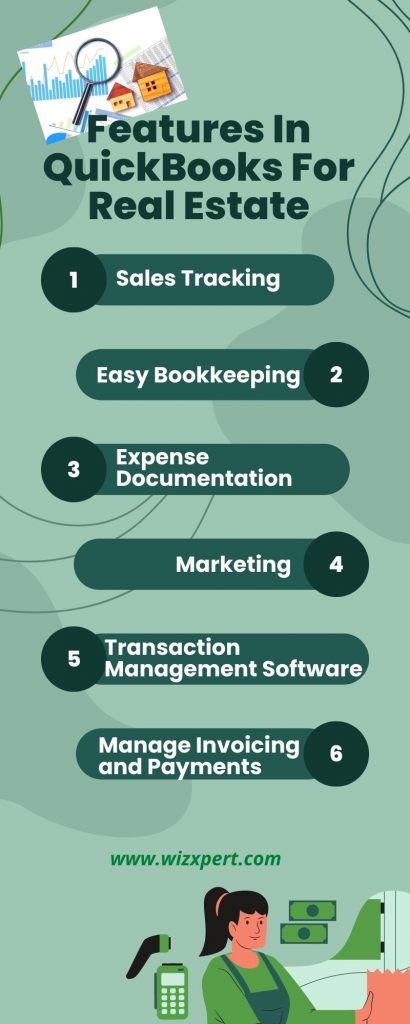QuickBooks plays an important role in making the best decisions for your real estate business. As it helps in managing the back office of real estate brokerage accounting. Here is an article for you, to learn more about its features, tracking investment, and versions of QuickBooks for real estate brokerage. To get more updated and informed you can talk to our QuickBooks expert at +1-844-405-0904.
QuickBooks for real estate helps in tracking the time spend on various endeavors. It helps you to stay organized by managing business activities such as marketing, sales, expense tracking, and taxes. Real estate agents need to run and manage the business efficiently for increasing sales and revenue. And also make informed decisions about where to take your business. QuickBooks will help in meeting all your real estate business goals.
Features In QuickBooks for Real Estate

Let us see how QuickBooks accounting software helps to grow your business for real estate.
Sales Tracking: You can keep track of your sales and monthly earnings to grow your business. It enters detailed information about your commission and sales. If you want to switch brokerage firms during the year, QuickBooks can track your sales by entering financial data in QuickBooks. Also, pay your bills on time and deposit earnings in your bank account. It adds your banking information and bills into QuickBooks software.
Easy Bookkeeping: You can enter a wide range of details in a few minutes, such as new client information and business expense. You don’t have to remember any important matters and dates. This will help in reducing your stress.
With the help of a mobile device, you can access apps that integrate with QuickBooks to track mileage, upload expenses, and enter contacts. You can organize your financial details in a database from where you can make bank deposits, pull reports, etc.
Expense Documentation: Real estate agents can deduct a wide range of expenses. These are home office expenses, mileage, entertainment, advertising, and office supplies.
Snap and attach receipts to your QuickBooks transaction entries. Thus, you don’t have to keep faded receipts in folders for years. You can create profit and loss statements after entering all your expenses. This is in the form of easy to understand format to fill out your tax forms. It consists of all your annual financial data.
Marketing: As a real estate agent, marketing is important to your success. You can integrate your customer list with QuickBooks. It will help get mailing addresses and email addresses for direct mail and email marketing campaigns. You can also use QuickBooks apps to expand your customer list while you are away from your desk or laptop computer.
Transaction Management Software: QuickBooks real estate software helps in tracking your investment efficiently. You can preview what will happen if you raise the rent, besides to automatically tracking investments. It will help to determine the most profitable price for the property you wish to sell. You can straight away review the report to regain your investment.
Manage Invoicing and Payments: QuickBooks Online allows you to send invoices to clients and vendors. When the invoice is due, you can simply type the name of the customer and fill out an invoice template to send it through email. The Pay Now option makes it easy for clients to pay directly from the invoice. Also, your clients will receive reminders through email if there will be any dues.
Tracking Investment with QuickBooks for Real Estate
It takes lots of paperwork to main your portfolio if you have invested in real estate. It requires a lot of effort and time in tracking the administration for rental properties. . You can use technology to track your real estate investment. For managing investment properties you need to gather legal documents. These are inspection forms, business receipts, tax files, and tenant agreements. QuickBooks tracking software makes all these tasks easier. It also records interactions with contractors and tenants’ complaints.
QuickBooks Online has many features to manage revenue streams. These are invoices, expenses, cash flow, receipts, taxes, and banking. You can also apply these categories to your real estate portfolio. To track property can add custom fields to sort, store and manage important information. There can be fields for different categories. Such as property description, floor plan, current rent, market rent, due dates, and upcoming maintenance.
QuickBooks Versions for Real Estate Brokerage
QuickBooks Online It robust reporting, ease of use, flexibility to customize, and a large support network. Each version meets the specific business needs. We have mentioned below the different QuickBooks versions which are beneficial for real estate.
- QuickBooks Online Self-Employed: This is for self-employed individuals who do not have employees. They report business income on Schedule C of their personal tax return.
- QuickBooks Online Simple Start: Manage your income and expenses in one simple tool. It tracks income, expenses, assets, and liabilities for a single user.
- QuickBooks Online Essentials: It allows you to track income and expenses. You can stay on top of accounts receivable and manage accounts receivable. You can also assign billable hours to customers, track due bills, and give access to three users.
- QuickBooks Online Plus: It helps to perform inventory tracking, budgeting, job costing, etc. It provides access to up to five users. This is best for business that sells product and services such as wholesalers, retailers, contractors, etc.
- QuickBooks Online Advanced: This is for a complex workflow that makes the repetitive task automated. You can have detailed reporting, and custom user permissions and provide access for 25 users.
You will gain valuable insights into your real estate business by tracking your income and expenses. This will also help you in making better business decisions in the future. QuickBooks for real estate can tell you how your business is performing for making important decisions. QuickBooks helps in tracking regular finances. This builds a predictable and sustainable real estate business. For more advice, you can reach our ProAdvisor by dialing our toll-free number +1-844-405-0904.
